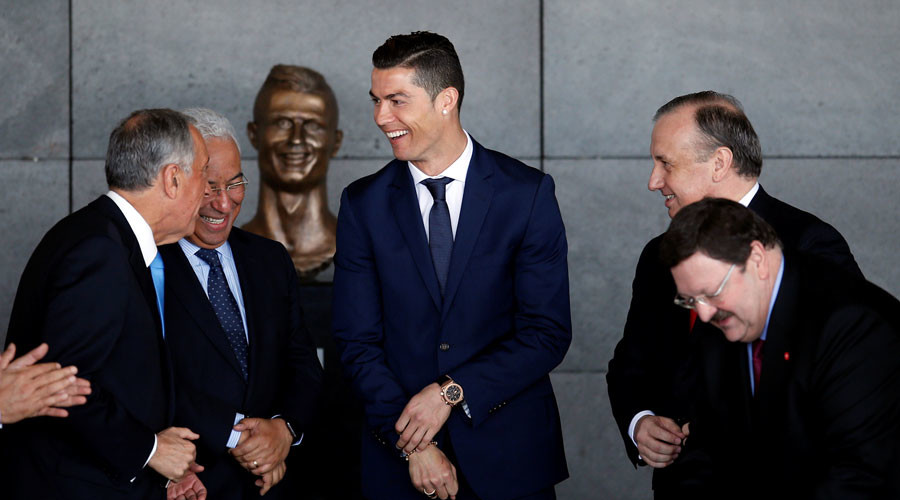
Is there anything more awkward than discovering that a statue of yourself looks nothing like you?
I cannot answer this question as it has not yet happened to me. But Cristiano Ronaldo could, if he were so minded, having seen the bronze version of his own good self that was presented to public view this week at Madeira Airport – henceforth to be known as Aeroporto Cristiano Ronaldo.
The local boy made good. But, sadly, the local boy was not made good. The bust in his honour is a fine resemblance – but not of him.
As many kind souls have taken to social media to point out, the sculptor has done an impressive job in capturing the former Arsenal, Manchester City and Ireland forward Niall Quinn. Or perhaps the former Charlton, West Ham and England full back Paul Konchesky.
Looking closely again at the bust in question, it has at least got one detail of the Real Madrid and Portugal forward’s features right – the parting is spot on.
A few miles down the road in Madeira – which has already named a hotel after Ronaldo and established his personal museum – there is another full statue of him on display.

It is certainly recognizable as a man in football kit. And, again, the parting is impressively reminiscent of the real thing. That apart…
A few years ago Lillian Bolt, the outspoken aunt of track and field superstar Usain Bolt, expressed her frustration over stalled plans to erect a statue of her famous nephew in his Jamaican birthplace of Falmouth, Trelawny.
“He has dominated the world like no other athlete, he caused the world to watch athletics again, and most important, achieved more than any other track athlete, yet no monumental recognition, not even a statue, not even a bust,” she raged to the local press.
“He is a foreigner in all the other countries that he visits, but they have shown that they value his worth more than his own people.
“The Bible is never wrong, a prophet has no honor in his own country, and that is so true with Usain.”
In the meantime other countries have honored him with a range of representation. There is a floral statue of him in Birmingham, a waxworks version at Madame Tussauds in London and, in Germany, an effort entitled “Bolt of Bolts”, composed entirely of spare bolts and scrap metal.
Careful what you wish for, Aunt Lillian…
That said, it has been confirmed this month that plans are well advanced for an eight-foot statue of Bolt – who has said he will retire after running at this summer’s World Championships in London – to be erected at Jamaica’s National Stadium in Kingston in time for the independence celebrations in August.
The statue, commissioned by the Jamaican Ministry, is being designed and created by renowned Jamaican sculptor Basil Watson.
It sounds as if it might turn out to be a success. If so, it would be in a minority as far as sporting tributes of this kind are concerned.
It is simply hard to remember any good ones – and easy to recall representations that have fallen short of their noble intentions.
The statues of West Ham’s three heroes of England’s 1966 World Cup victory, Bobby Moore, Geoff Hurst and Martin Peters, along with Everton’s Ray Wilson, who was part of the scene that was recreated in bronze, celebrate the peak of home football prowess and also stand as a memorial to the great captain, Moore, following his premature death in 1993.

Nothing could be more fitting.
But for all the attention to detail in the pose, with Moore hoisted as he had been on that early summer evening of July 30 on the shoulders of Hurst and Wilson, the faces are unlike any of the players represented. Sorry, but if you are going for accurate representation, make it accurate.
The single statue of Moore at Wembley is better – but I’m sorry, for me Brian it just does not look like Bobby Moore…
There was a similarly well-intentioned and poorly executed statue of Sir Bobby Robson erected at Newcastle United F.C.
But that was a model of verisimilitude compared to some other sporting statuary created in recent years around the world.
Perhaps two of the worst are those created to celebrate the achievements of the Barcelona and Cameroon forward Samuel Eto’o, and the former England manager Sven Goran Eriksson.
The strange representation of the late Michael Jackson that was erected outside Fulham FC’s ground in 2011 by then owner Mohammed Fayed, a friend of the singer, was widely execrated for its inaccuracy and inappropriateness.
Louisa Buck, contemporary art correspondent for The Art newspaper, described it as “a spectacularly bad piece of kitsch that doesn’t even look all that much like Michael Jackson.”
Change the name around, and it is a description that would fit many a sporting statue around the world.
But not the one outside Leeds United F.C depicting their former midfielder Billy Bremner.
Yes, the arms are too big and too long to be completely representational. But the overall effect is a convincing recreation of that exasperating but eternally effervescent player.
Similarly, the representation at the Nou Camp of Johan Cruyff, the celebrated Barcelona and Netherlands star who died last year, is unequivocally abstract.
Yet it conveys something of the essential element of a footballer who holds his place in the company of Pele, Maradona, Lionel Messi and…who else was it? Ah yes. Cristiano Ronaldo.
By Mike Rowbottom
Republished with permission from insidethegames.biz.